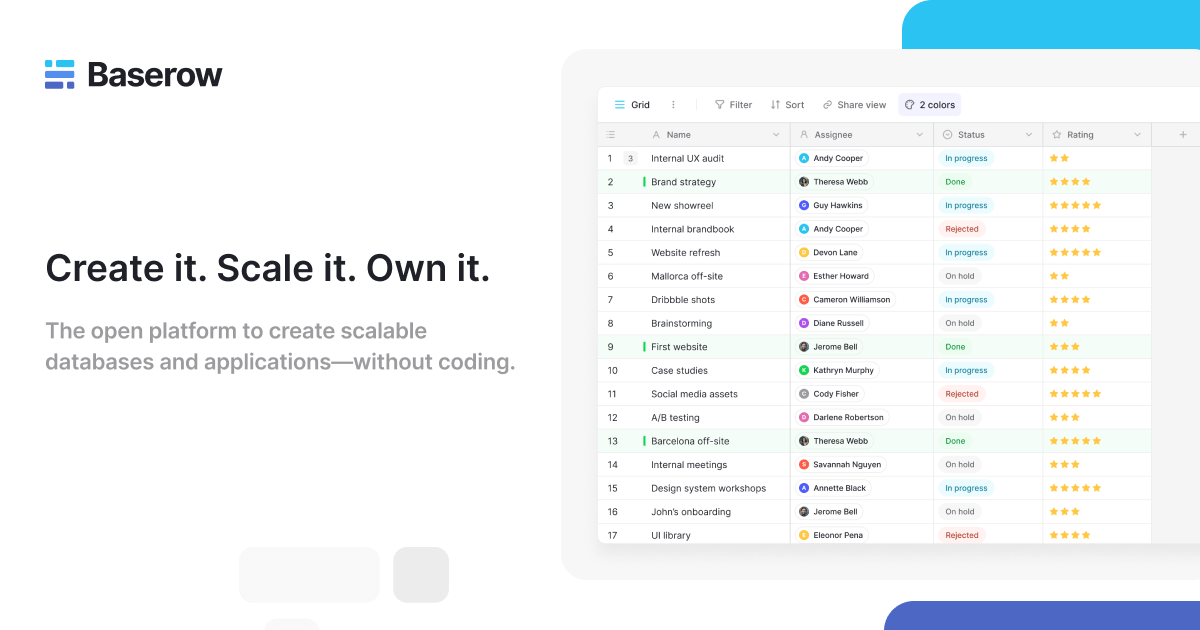Discovering the Benefits of Scalable Databases That Call For No Coding Skills for Effective Information Administration Solutions
The introduction of scalable data sources that remove the necessity for coding skills provides a transformative chance for companies looking for efficient data administration remedies. As we take into consideration the implications of such developments, it ends up being vital to check out just how they can reshape the landscape of data administration and drive sustainable growth in a competitive environment.
Enhanced Ease Of Access for Individuals
Improved ease of access for individuals is an essential facet of scalable data sources, making certain that information monitoring systems are instinctive and straightforward. In a period where data-driven choices are paramount, ease of access allows a larger series of users, including those without extensive technological proficiency, to engage with data source systems successfully. This democratization of information gain access to helps with improved cooperation throughout departments, empowering staff members to draw out insights and make notified decisions.
Straightforward user interfaces, such as drag-and-drop functions and visual information representation, streamline complicated data communications. These improvements minimize the knowing curve related to conventional database monitoring, allowing users to concentrate on leveraging data as opposed to coming to grips with technological complexities. Scalable data sources frequently include customizable control panels and real-time analytics, giving users with instant understandings tailored to their particular requirements.

Cost-Effectiveness and Source Cost Savings
Efficient data management not only rests on accessibility but also on cost-effectiveness and source cost savings. Scalable data sources made for individuals without any coding skills dramatically decrease financial worries typically connected with traditional database monitoring systems. By eliminating the requirement for specialized programming proficiency, organizations can designate their resources more effectively, focusing funds on core organization activities instead of extensive training or employing experienced personnel.
Additionally, these data sources typically make use of cloud-based services, which additionally reduce costs connected to equipment and maintenance. Organizations can scale their data source solutions according to their requirements, staying clear of the expenses incurred from over-provisioning sources. This adaptability means companies can adjust to transforming needs without incurring unnecessary prices, leading to considerable long-lasting financial savings.
In addition, user-friendly interfaces enhance information access and monitoring procedures, reducing the time spent on administrative jobs. This effectiveness converts right into labor price financial savings, permitting groups to concentrate on strategic initiatives as opposed to regular upkeep. In general, embracing scalable data sources that need no coding abilities promotes a much more economical technique to data administration, enabling organizations to optimize their sources while keeping high degrees of operational effectiveness.
Improved Collaboration Across Teams

In addition, scalable databases help with smooth interaction amongst employee. With easy to use user interfaces that require no coding skills, workers can conveniently develop, customize, and share records or control panels customized to their specific requirements. This democratization of information equips non-technical customers to add understandings, enhancing the collaborative atmosphere.
Furthermore, these databases support simultaneous gain access to, enabling several customers to work on the very same dataset simultaneously. This attribute improves performance, as teams can participate in joint data evaluation without the threat of version control concerns. The capacity to leave notes or comments straight within the data source even more promotes discussion and clears up data analyses.
Streamlined Data Administration Processes
In today's data-driven setting, companies acknowledge the necessity of structured data monitoring refines to optimize effectiveness and accuracy. By leveraging scalable data sources that call for no coding abilities, services can streamline their data handling and reduce the intricacies typically related to typical data source systems. This ease of access encourages non-technical individuals to engage directly with information, assisting in quicker decision-making and decreasing reliance on specialized IT employees.
Streamlined information monitoring processes enhance operations by automating routine tasks such as information entrance, validation, and coverage. Automated data assimilation makes sure that information from numerous sources is aggregated flawlessly, getting rid of silos and cultivating a linked view of critical organization metrics (no-code). Straightforward interfaces permit personnel to adjust data quickly, allowing them to generate understandings that drive strategic efforts without the demand for substantial training.
This efficiency not only increases operational processes yet also lessens the possibility for human error, making sure that data stays exact and reputable. Eventually, structured data administration procedures via scalable databases result in improved performance, permitting organizations to focus on core tasks while ensuring that their data administration techniques are reliable and efficient.
Scalability for Expanding Businesses

For increasing business, the capacity to scale up or down is critical. A scalable data source can manage an influx of data created from brand-new clients, products, or solutions, making certain that service operations remain uninterrupted. These databases give the ability to manage peak lots effectively, which is important during durations of rapid development or seasonal spikes.
Furthermore, numerous scalable data source options are designed with straightforward interfaces that call for no coding skills, empowering non-technical team to handle information successfully (no-code). This democratization of data monitoring allows companies to allot sources strategically and decrease reliance on specialized IT employees
Eventually, adopting a scalable database not just improves functional efficiency yet also promotes an environment where services can advance and innovate without the constraints of typical database systems. This versatility placements organizations for long-lasting success in today's affordable landscape.
Conclusion
In conclusion, scalable databases that require no coding skills offer significant advantages for efficient data management. By streamlining data monitoring procedures and supplying scalability for expanding organizations, such remedies make it possible for organizations to adapt to changing demands effectively.
Boosted access for customers is a crucial aspect of scalable data sources, making certain that information administration systems are straightforward and intuitive.User-friendly user interfaces, such as aesthetic information and drag-and-drop functions representation, streamline complicated data communications. In general, adopting scalable data sources that need no coding skills cultivates an extra economical method to information administration, enabling companies see to maximize their sources while preserving high levels of functional effectiveness.
By leveraging scalable data sources that need no coding abilities, services can simplify their information handling and decrease the intricacies usually linked with conventional data source systems - no-code.Structured information administration procedures improve operations by automating routine jobs such as data entrance, recognition, and reporting